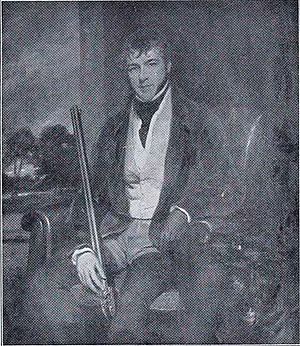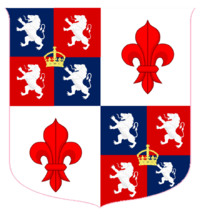Edward Harbord, 3rd Baron Suffield facts for kids
Quick facts for kids
Edward Harbord, 3rd Baron Suffield
|
|
|---|---|

portrait possibly by Martin Archer Shee
|
|
| Born | 10 November 1781 Albemarle Street |
| Died | 6 July 1835 St James's Street |
| Alma mater | |
| Occupation | Politician |
| Parent(s) |
|
| Family | William Harbord, 2nd Baron Suffield |
| Position held | member of the 4th Parliament of the United Kingdom (1807–1812), member of the 3rd Parliament of the United Kingdom (1806–1807), member of the 7th Parliament of the United Kingdom (1820–1821) |
Edward Harbord, 3rd Baron Suffield (born November 10, 1781 – died July 6, 1835) was an important British politician. He was known for his liberal ideas and for fighting against slavery. He also worked to make prisons better. From 1786 to 1821, he was known as The Honourable Edward Harbord.
Contents
Who Was Edward Harbord?
Edward Harbord was the second son of Sir Harbord Harbord, 1st Baron Suffield. His father was a politician who became a Baron in 1786. Edward's mother was Mary Assheton. His older brother was William Harbord, 2nd Baron Suffield.
Edward's Early Life and Education
Edward went to Eton College in 1791 when he was 10 years old. He had his own house and a servant there. He also had a private tutor who taught him liberal ideas. These ideas guided him throughout his life.
After Eton, he went to Christ Church, a college at Oxford University. He traveled around northern Europe, including Russia, before finishing his studies in 1802. His father wanted him to become a lawyer, but Edward found too many distractions in London.
Edward's Political Career
Edward Harbord became a Member of Parliament (MP) for Great Yarmouth in 1806. He held this position until 1812.
Joining the Army
In 1808, when the Peninsular War started, Edward joined the army. He went to Portugal to report on the war's progress. He was even offered a job as a private secretary to the War Minister, but delays prevented him from taking it.
Standing Up for What's Right
In 1819, Edward shocked his family by speaking out at a public meeting in Norwich. He called for an investigation into the "Peterloo massacre". This event happened in Manchester, where cavalry attacked a large group of people asking for political reform. Many people were hurt or killed.
Edward personally looked into what happened. He believed the local officials had panicked. He also disagreed with the government's harsh new laws, called the Six Acts, which tried to stop public meetings. Edward declared himself "Independent," meaning he didn't fully belong to any political party.
His brother, William, was very upset by Edward's strong views. William had inherited a large estate called Blickling in Norfolk. Because of Edward's political stance, William changed his will. This meant Edward would not inherit Blickling Hall.
Returning to Parliament
In 1820, Edward returned to the House of Commons as an MP for Shaftesbury. He had the support of Robert, 2nd Earl Grosvenor, who agreed with Edward's reform ideas.
In August 1821, Edward's older brother died, and Edward became the 3rd Baron Suffield. He inherited the Gunton estate in Norfolk. As a Baron, he immediately lowered rents for his tenants. He also let them vote freely and built a school. He even resigned from the local army group to avoid ever being in a situation like Peterloo.
Fighting for Change: Abolishing Slavery
Lord Suffield became very active in the House of Lords, especially in fighting to end slavery.
Working with Thomas Fowell Buxton
He met Thomas Fowell Buxton in 1818. They both worked on prison reform. In 1822, important anti-slavery leaders like William Wilberforce and Zachary Macaulay met with Buxton and Suffield. They convinced Buxton to lead the fight against slavery.
Lord Suffield chaired several large meetings of the Anti-Slavery Society. These meetings had thousands of people attending.
The House of Lords Committee
In 1832, a special committee was formed in the House of Lords to study slavery. Out of 25 members, 10 owned slaves. Lord Suffield was the only strong supporter of abolition. Even though he and Buxton felt there was already enough evidence of slavery's cruelty, the committee helped. For example, one slave owner, the Earl of Harewood, learned how his own estate manager was mistreating slaves and fired him.
Passing the Slavery Abolition Act
In July 1833, Lord Suffield led the effort to pass the Slavery Abolition Bill through the House of Lords. He presented many petitions from people who wanted to end slavery. He fought hard for each part of the bill. Thomas Buxton admired him greatly, saying Lord Suffield's voice, though often alone, had to be heard.
When the Slavery Abolition Act was finally passed, abolitionists celebrated. Lord Suffield chaired the celebration.
Other Important Campaigns
Besides fighting slavery, Lord Suffield worked on many other liberal causes.
Prison Reform
He co-founded the Society for the Improvement of Prison Discipline in 1816. He worked with Elizabeth Fry, Thomas Buxton, and Dr. Stephen Lushington. He wanted to improve conditions in prisons and ban harsh punishments.
Other Social Issues
- He worked to improve laws about homelessness and the sale of bread.
- He supported Queen Caroline when the King, George IV, tried to divorce her.
- He pushed for changes to the game laws, which made it illegal for most people to sell hunted animals.
- He successfully passed a law in 1827 to ban dangerous "spring guns" used to catch poachers.
Political Reform
Lord Suffield believed in constitutional reform. He pointed out that only a small number of people could vote. He argued that Parliament needed to be reformed to truly represent the people. People he had met after the Peterloo massacre praised his speeches. They felt he was a true guardian of people's rights.
He also disagreed with bishops having seats in the House of Lords. He supported allowing Roman Catholics to have more rights, even though many of his own political allies did not.
Helping Others and Legacy
Lord Suffield was a very generous person. He believed in helping people help themselves. He would offer money to people if it helped them earn a living in the future, rather than just giving them temporary relief. He even suggested ways for parishes to help laborers grow their own food.
He helped farmworkers who couldn't find jobs move to Canada. A place in Toronto, Harbord Village, is thought to be named after him.
He also supported the National Association, which later became the RNLI (Royal National Lifeboat Institution). This organization helps save lives from shipwrecks.
In 1833, he started the Norfolk Cricket Club and was its first president. Two of his sons later became president of the Marylebone Cricket Club (M.C.C.).
Family Life and Death
Lord Suffield married Georgiana Vernon in 1809. After she died in 1824, he married Emily Harriet Shirley in 1826.
Lord Suffield died in July 1835, at age 53. He passed away after falling from his horse. He was buried at Gunton, Norfolk. His son, Edward, from his first marriage, became the next Baron Suffield.
His son, Charles Harbord, 5th Baron Suffield, was a close friend of Edward VII, who later became King. A place in Alberta, Canada, called Suffield, is named after Charles.
Arms
|
 | John T. Biggers |
 | Thomas Blackshear |
 | Mark Bradford |
 | Beverly Buchanan |



